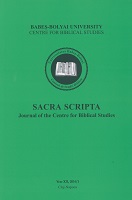ZECHARIAH 9,9-10 IN THE OT AND EARLY JUDAISM
ZECHARIAH 9,9-10 IN THE OT AND EARLY JUDAISM
Author(s): Mihai HandaricSubject(s): Christian Theology and Religion
Published by: Universitatea Babes-Bolyai - Centrul de Studii Biblice
Keywords: Deutero-Zechariah; Zechariah 9,9-10; independent unit; oracle vision; coming king; Josiah; Judaism
Summary/Abstract: The scholars accept that the second part of Zechariah, known also as the Deutero-Zecharia (chapters 9-14), creates some of the most difficult problems concerning its literary structure, authorship, historical setting and its relationship with Proto-Zechariah (chapters 1-8). The passage from Zechariah 9,9-10 is one of these texts intensely debated by theologians. This paper intended to show that Zechariah 9,9-10 may have been circulated as an independent unit before being introduced in the book of Zechariah. Comparing this text with other similar biblical passages, it was supported that the text circulated in the form of a special oracle vision. Based on the internal evidences, it was suggested that Zechariah 9,9-10 could be composed during the time of Josiah's reign, a Davidic king, who represented the hope for Judah. Even though the sudden death of Iosiah cut down the hope of his generation, it was considered that the passage could circulate as a motif of hope for the next generations. The passage could have been introduced into Deutero-Zechariah, some time at the end of the sixth century, after the year 520 BC, when the prophet Zechariah's wrote his book. It was argued that Zechariah could write Deutero-Zechariah, some time later than Proto-Zechariah, in a different context. The paper presents the work of Yahweh and his coming king. It is underlined the moral character of the king, described as being צדיק saddiq – righteous. Looking to the context, we understand, that the same moral character of the king was expected also from the community to which the king is coming. As far as the reception of Zechariah 9,9-10 in Judaism and in LXX, we observed a variant reading of Zechariah 9,10, between the Masoretic text and Septuagint, which could support an identification of Yahweh with the coming king. The New Testament identified the king with Jesus Christ entering triumphantly in Jerusalem.
Journal: Sacra Scripta
- Issue Year: XII/2014
- Issue No: 1
- Page Range: 7-42
- Page Count: 36
- Language: English
- Content File-PDF

